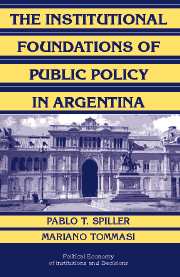Concluding Remarks
Published online by Cambridge University Press: 17 March 2011
Summary
This book began with the observation that Argentina's policies have shifted dramatically over time, and with the claim that its inability to produce consistent public policies is the reason behind its economic misfortunes. We argued that the deficiencies of Argentine public policies are the outcome of a policy-making process in which key actors have little incentive to cooperate with one another over time, leading to myopical political and policy choices. Argentina has, thus, been unable to steer a consistent path in crucial areas such as economic, social, or international strategies.
Argentina has a national policy-making environment dominated by executives who tend to have too much leeway to pursue whatever policies they fancy, provided they can buy the support of quasi-feudal provincial governors with fiscal largesse. Such a depiction is somewhat surprising for a country that has a basic constitutional structure with separation of powers quite similar to that of the United States. In spite of a common basic constitutional structure, the workings of political institutions in Argentina couldn't be more different than in the United States. The Argentine Congress is neither the arena where key policies are negotiated nor a very attractive place to develop a political career. The Argentine Supreme Court is not a respected institution with the power to act as a real check on executive power. In Argentina, there is no policy delegation to well-staffed independent professional agencies supervised by Congress through the power of the purse.
- Type
- Chapter
- Information
- The Institutional Foundations of Public Policy in ArgentinaA Transactions Cost Approach, pp. 208 - 210Publisher: Cambridge University PressPrint publication year: 2007



